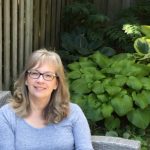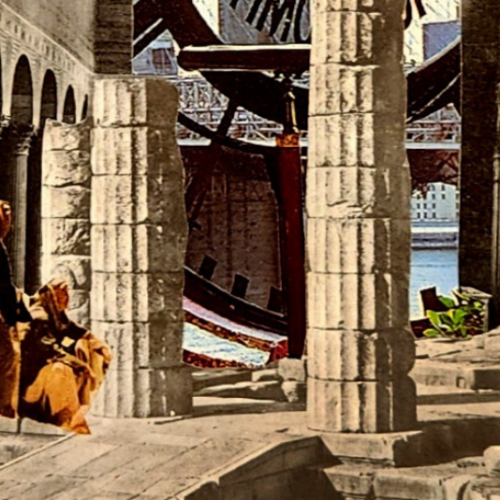Vivian didn’t know how much more she could take. Maury moped around the cabin, hardly going outside, annoyingly underfoot. If he wasn’t sleeping or bothering her, he was plunked in front of the window staring at that damn jack pine, its branches gnarled and lopsided—a Halloween tree, she called it. She wanted to cut it down, but he wouldn’t hear of it. He called it “his kin,” although what that meant she didn’t know.
She moved to the kitchen to finish making dinner, slamming the drawers extra hard.
“Take it easy on the cupboards!” Maury hollered, and she paused for a moment, irritation snaking up her spine.
He rose from his chair and leaned against the door frame, his eyes on her while he fingered a cigarette in one hand, a lighter in the other.
“You’re not doing that in here!” Her eyes widened.
“Keep your knickers on.” He crossed the tiles to the side door. “I’ll do my dirty business outside. As always.” The door banged behind him.
She breathed a sigh of relief and briefly considered locking the door—the back door and windows too. It would serve him right, and she’d finally get some peace in this godforsaken house. The place he’d convinced her was the perfect place to retire. That was years ago, though, and here they were, still stuck in the bush, with nothing to relieve them from the day-to-day slog of everyday life together.
Sinking into her favourite chair in the living room, she reveled in the quiet. Shadows of tree branches danced across the curtains. It was lovely here in many ways; she’d admit that. Peaceful and calm for the most part, the summers glorious, the early morning chatter of blackcap chickadees, cedar waxwings, and mourning doves a balm for loneliness. But they were on the cusp of spring now, the ground mucky and brown, the trees’ foliage a secret yet to unfurl. Sandwiched between the beauty of the snow in winter that encased the cabin like a snow globe, and summertime with its rogue wildflowers, everything was dull. Grey. A few stubborn mounds of snow dotting the landscape, spit through with pine needles and pebbles. Although the days were lengthening, the land was still mostly mud, twigs, and barren trees. She hated it.
The door flew open, the knob hammering against the dented drywall, and Maury lumbered in, letting the chill fill the room along with a trail of smoke. He grabbed a beer from the fridge, then dropped into his armchair with its view of the lake in the distance and the craggy outcropping of rock.
As Maury sat, Vivian raised her hand to her nose and stood. It was Sunday, and although the days of the week meant little anymore, she maintained the tradition of a roast on Sundays, even if she did tend to overcook it, causing them to douse the meat with generous amounts of gravy to keep it from sticking in their throats.
“Pinus banksiana,” Maury called over his shoulder.
“What?” she called back, the heat of the oven fogging her glasses as she removed the potato casserole.
“I said, Pinus banksiana.”
“Penis what?” she yelled, flushed and sweaty.
Maury spewed his mouthful of beer, doubling over with laughter. “No, no…I said PINUS banksiana.”
“What the hell is that?”
“The real name of that tree. The scientific name, I should say.”
“That ugly thing? You know I’d like it cut down—it’s horrid.” Nudging the oven door closed with her hip, Vivian carried the roast to the kitchen island to let it rest before carving.
“Just thought it was interesting, Vivvie.”
The hurt in his voice and the tenderness with which he said her pet name made her pause. He hadn’t called her that in a very long time.
“Really?” She set the oven mitts on the counter beside the unopened bills and Guide for Caregivers brochure from the Alzheimer Society, the contact number circled. She shoved the brochure in the bin, and smoothed her hair, then drew nearer, cradling her cup of tea between her hands.
“I saw a painting once.” He looked at her hesitantly, his eyes as blue as the day they’d met—the colour somewhere between worn denim and the sky after a summer shower.
She waited, fearful of breaking the spell.
“It was before I knew you. When I was young.” He glanced at her again, shy, like they hadn’t been married all these years. “It was a picture of a tree like that. A jack pine.” He gazed out the window. “Made me feel like I was there, right on the rock where it grew,” he said, his voice growing so soft she had to lean closer to hear him. “Like I could feel the wind from the lake.”
Vivian chewed her lip. This was more than he’d said to her in weeks, and she pondered her response, like approaching a deer in the forest.
“I… I’d like to see that painting,” she said, almost afraid to hope they could like each other again, even for a little while. “We could look it up on the computer…maybe take a road trip, like we used to…go see it together?” She studied his profile, its contours as familiar to her as her own face: the strong line of his chin, his angular nose, the arc of his perfect shell-like ears. He was still a handsome man.
He stared out the window, strumming his fingers against the arm of the recliner. He tapped a rhythm over and over for so long Vivian thought perhaps he’d forgotten she was there.
“What are you gawking at?” he barked, startling her so that tea sloshed over the side of her cup.
“Nothing…nothing Maury. It’s okay, it’s—” She reached to caress his hand, mottled with age spots.
Maury yanked his arm away. “You never have anything good to say, do you?” he bellowed and rose from his chair, the empty beer can clattering on the floor. He stormed into the bedroom, muttering, “Nag, nag, nag.”
She sat awhile, shaken. After all these years, how could this be what their life amounted to? All their years together: meeting in high school, their years at university, and then raising two boys, now grown with families of their own. She recalled her first day as an undergraduate, talking Maury’s ear off on the phone the night before, nervous about finding her classes. As she rounded the walkway to the building that morning, there he stood—like a sentry—having located her classes for her. She’d been so touched by his thoughtfulness; she’d kissed him right then and there, fully on the mouth, ignoring the sidelong glances of strangers as they hurried past.
So long ago. She swatted the memory away with her hand and got up to dish out the potatoes and retrieve the carrots from the steamer before they turned limp. She carved two thick slices off the roast—overdone again—and then sat at the table and wept. Wept for the dinner, for the cabin, for the cruelty of his illness.
She wiped her eyes and blew her nose on a tissue. She couldn’t let him see her like this. Someone had to be the strong one. As she set their plates on the table, he emerged from the bedroom wearing shorts and a Bermuda shirt, and she pursed her lips, saying nothing. They sat at the table in the same spots they’d sat for so many years, and she placed her hand lightly over his.
“You’re a good man, Maury. A good father. A good husband.”
For a moment, his eyes met hers, like a veil had lifted, fragile and ephemeral, his eyes bright like they used to be. These were the moments she lived for, and she tried to capture it like a photograph, one to take out and look at again later.
But the shadow returned to his face, and the moment vanished. He shoved his chair back, grabbed his cigarettes, and headed for the door.
“You’ll be cold!” she blurted.
“All you ever do is pester,” he said, and as he passed, his hand brushed her plate, and it crashed to the ground—meat, potatoes, and carrots, a lump of brown mush on the floor.
“See?” he shouted, motioning to the mess. “You made me do this!” He pointed at her. “You always blame me when it’s your fault. Your fault.” He bolted outside, staying not more than a few minutes, then stomped back inside and stormed to the bedroom, and slammed the door.
She waited in the silence of the cabin, the storm windows rattling as the wind picked up. Eventually, she peeked into the bedroom, her shoulders relaxing at the undulation of his soft snores. In the kitchen, she scraped the food off the floor into the garbage, then parceled the leftovers into containers, and placed them in the fridge where he’d find them at some point during the night.
She poured a generous glass of wine and plucked the glossy brochure out of the bin, wiping smears of roast beef and carrots from the photo of smiling faces. She hesitated a moment, then dropped in the chair where he sat most days, staring. That jack pine. Ugly and tenacious, gripping the rock with its knotted roots, determined to hang on. Her stomach clenched, and she bit her lip. His ‘kin’. Clinging to stone.
Folding the brochure in half, she tucked it into her sweater pocket to phone the number in the morning and then sobbed. Hands clasped over her face, her spine curved as if in prayer, she rocked back and forth, while across the sparkling water, the plaintive call of loons echoed.

Dawn Miller
Dawn Miller holds B.A. (English) and B.Ed. degrees from Queen’s University in Kingston, Ontario Canada. Her short fiction has appeared in Verandah Literary & Art Journal, Canadian Authors Association Fifteen Stories High 2021 Short Story Anthology, and Loud Coffee House Press. She and her husband are currently building a house in Prince Edward County, Ontario (complete with a dedicated writer’s room). Dawn is currently querying her debut novel to literary agents. You can find Dawn at www.dawnmillerwriter.com and @DawnFMiller1 on Twitter.



